It’s time to recycle more plastics. In 2015 more than a billion pounds of plastic bags and wraps were recycled in the U.S. — the national recycling rate is approximately 15 percent.
The following article can be found on the August 9, 2017 edition of CT News Junkie.
Although recycling this amount of recycled plastics represents the equivalent positive impact of taking 111,000 cars off the road, it also means a lot of these plastics are not being recycled.
For some time now, many grocery and retail stores have accepted plastic bags and wraps for recycling in storefront bins — we typically see these bins at major grocery chains and big box stores. But a recent survey of Connecticut residents found that only about half of us are aware that “certain plastic items should be taken to grocery or retail stores to ensure proper recycling.” That means that about half of us are not aware of this.
The survey found that even among those of us who are aware, we’re not really clear on precisely which plastics should be taken to stores. Unfortunately, this results in too many of us putting plastic bags and wraps in curbside recycling bins, where they do not belong. Or throwing out perfectly recyclable, valuable materials.
We want to change that and do a better job recycling plastics here in Connecticut.
A new campaign is underway this year to encourage state residents and businesses to increase recycling of plastic bags and wraps. The campaign is part of Connecticut’s WRAP (Wrap Recycling Action Program), a partnership that includes government, businesses, and recycling advocates.
The goals of the campaign are simple: increase the amount of plastic bags and wraps being returned to retailers for recycling, reduce unwanted bags and wraps in curbside bins, and help reduce litter.
So what precisely do participating retailers accept for recycling in their storefront bins? Plastic bags such grocery bags, newspaper bags, produce bags, bread bags, dry cleaning bags, and even zipper bags. They also accept plastic wraps from water bottle cases, diapers, bathroom tissue, paper towels, and more, as well as bubble wrap and shipping pillows.
You can go to plasticfilmrecycling.org to learn more about where and what to recycle.
The plastic bags and wraps must be clean and dry when placed in storefront recycling bins. They get recycled into products such as new grocery bags, benches, and decking.
As noted above, in addition to removing these valuable materials from our garbage and creating new products, this campaign helps remind us that plastic bags and wraps do not belong in our curbside recycling bins. Putting the wrong plastics in curbside bins makes recycling more difficult, time consuming, and expensive, which winds up costing all of us more money.
So please spread the message, pitch in, and recycle plastic bags and wraps by taking them back to participating retail stores.
It’s time to recycle more plastics.
Wayne Pesce is President of the Connecticut Food Association, which is included among the sponsors of this website. For more information, visit plasticfilmrecycling.org.

